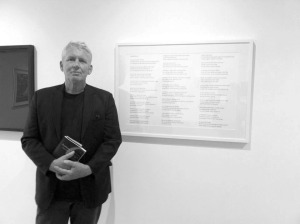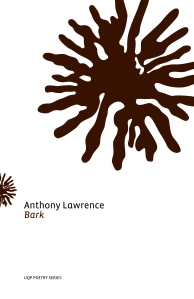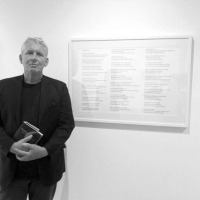Anthony Lawrence: poetry, passion and plagiarism

Anthony Lawrence, Blake Poetry Prize 2013 winner
After leaving school at 16 to become a jackeroo, Anthony Lawrence decided with an almost grim determination to become a poet, teaching himself technique and mixing with other poets like Robert Adamson who greatly inspired his early work.
I first encountered Anthony pounding the streets at Clunes Booktown and my introduction to his writing was with The Welfare of My Enemy, an experimental and disturbing book-length poem looking from all-angles at missing persons: who they are, who stole them in the dark; why they return.
His most recent book is Signal Flare and you can read Judith Beveridge’s wonderful intro to this book (from the launch), which gives real insight into his practice and predilections.
He now lives in Queensland where he writes and teaches poetry.
I spoke to Anthony Lawrence after his poem ‘Appelations’ won the 2013 Blake Poetry Prize.* You can hear Anthony reading his winning poem on Radio National.
At what point did you decide you wanted to be a poet? Was it a gradual process or a struck-by-lightning moment?
There was no decision. My early childhood was fairly normal, although I do remember being called ‘different’. Poetry was never a part of it. I was a below average student in primary school, and at high school my efforts ebbed below the Plimsol line and stayed there. I hated school and many of the teachers. I can’t remember poetry being a part of any English lesson and, if it had been, then Mary MacKillop would no doubt have been dragged out, hence my inability to remember. It wasn’t until Year 10 at a rural boarding school, where I’d been sent for being uncontrollable (a potent variation on the word ‘different’) that poetry came sharply into focus.

Anthony Lawrence’s The Welfare of My Enemy looks into the disturbing undercurrents of Missing Persons
I’d discovered the novels of Alistair MacLean and Wilbur Smith, and I was in the library one night, checking the shelves. I strayed into the poetry section which from memory was quite extensive and (I know now) adventurous for a private boys’ school. I found a book called Rommel Drives On Deep Into Egypt by Richard Brautigan, which had a black and white photo of a man in a sad-looking hat playing in a child’s sand pit with a bucket and spade. I loved that the title and cover were completely at odds, and I sat down and started reading. Those poems were what I’d been hoping for all my life. They were strange, compelling, and moved me in a profound way. It was the first time I remember being involved with something that gave me a glimpse into the miraculous, even if I didn’t understand some of what Brautigan was saying. Poetry. Magic. Full immersion. I finished the book and went looking for others. The next book was Selected Poems by Leonard Cohen. Magic. Hurt. Delight. Confusion. Poems about sex and travel, longing and the writing life. I stole those books and kept them under my mattress. I devoured them. I was 15 and my life had changed forever.
After I was expelled from boarding school, I worked on a sheep station outside Jerilderie, in the Riverina. It was here that I started writing poetry, without any idea of what I was doing. I had my stolen books, a pen and writing pads. I wrote constantly and, when I came home to Sydney a few years later, my parents bought me a small Olivetti typewriter and I typed up all the bad and sentimental poems I’d written by hand over the years. They were concerned. I was much quieter, and writing poetry and reading it to anyone who’d listen. One afternoon I came home and mum told me she knew what I had to do to become a real poet. She handed me a piece of paper with a list, in her hand-writing, down the page:
Read poetry every day, whatever you can buy or borrow.
Write whenever you can.
Meet with other poets.
Clearly mum had had an epiphany that defied the wildest expectations. Then she told me that, while I was out, she’d gone through the Sydney White Pages phone book, looking for anything under P for Poetry. She found Poetry Society of Australia, and dialled the number. A man answered. She told him that she thought her son may well have become a poet, and she was worried about him. The man said, ‘Don’t worry, that’s wonderful.’ Then he gave mum his address and asked her to pass it on to me, that I should visit that week and there was going to be a poetry reading and film night. The man was Robert Adamson. I’d never met a real poet, and this news was just what I needed. So a few nights later I drove over to Lane Cove and was met by Cheryl Adamson, Robert’s wife. I could see a man on the carpet with wild black hair in a purple jumper, leaning over a large sheet of paper. Robert Adamson was designing the cover for an edition of New Poetry magazine.
That night the house was filled with poets. I met Robert, Dorothy Hewett, Nigel Roberts, Geoffrey Lehmann, Judith Beveridge, and the visiting American poet Robert Duncan. At the end of the night, Nigel Roberts came to me and said quietly: ‘You’re not going to know whether to curse or bless your mother for what she’s done, casting you into the lion’s den of Australian poetry. But my guess is you’ll thank her, and often.’
Your poem won the Blake Poetry Prize (and a number of others were highlighted by the judges). Why did you decide to enter your poems?
I’d entered the Blake Poetry Prize twice before, with the poem from my second entry, ‘Winging It’, being short-listed. I loved that the Blake Prize for Religious Art was now including poetry as a vehicle for celebrating the religious, spiritual or sacred. And William Blake has been a major source of inspiration for me over the years. It was an easy decision.
Was your winning poem ‘Appellations’ written specifically for the awards, or a poem that was in gestation for a long time? Tell me how you came to write it.
‘Appellations’ was not written for the Blake Prize. It was begun six months earlier while riding a pushbike along the coastal path from Casuarina to Cabarita Beach. The first two lines arrived, fully formed, and they started changing as I pedalled, and I didn’t have a pen and paper, and my memory can’t be trusted. So I found a small stick, dug into the grocery basket, found the tin foil, ripped off a sheet, and carefully inscribed the lines with a splinter of watttle. At home I typed them up. Later, when I had to let the poem go, I decided to enter it into the Blake.

Anthony Lawrence’s In the Half Light: a novel about the impact of schizophrenia
How much of your poetry is about exploring spiritual themes, the big questions?
Many of my poems explore the spiritual or sacred elements of life, though rarely directly, and never with a singular focus. If I write about landscape or the natural world in general, I do so with one eye on the subject matter and one on the spaces between the pandanus palm, the pair of Brahminy kites, the dolphin pod and the headland. This is where the wellspring of magic and the ineffable live. They can’t be summoned at will, and tamed. They can be teased out into the open, and glimpsed, and from these rare sightings, we can try to define that which gives us the ghost-print of something sublime. The commonplace is riddled with amazement and stunning metaphors. We can train ourselves to find them, but it takes years and a willingness to work hard, in isolation, for long periods without goals or thoughts of success. Sounds very zazen, I know, but the similarities between meditation and writing poetry are vital and real, as is self-hypnosis.
You were an instrumental part of the discovery that award-winning poet Andrew Slattery was plagiarising other poets’ material. How did you initially make that discovery?
I was a guest at the 2013 Josephine Ulrick Poetry Awards dinner, where Andrew Slattery read his ‘winning’ poem. I’d not met Slattery previously, and had liked many of the poems I’d read in magazines and journals over the years, so I was looking forward to hearing him read.
Halfway into the poem alarm bells started going off. First I heard a few lines from Billy Collins’ poem ‘Forgetfulness’, and then a couple of lines from Philip Larkin’s ‘Days’. While I was on edge, I assumed Slattery must have acknowledged these lines at the end of his poem. MTC Cronin, one of the judges, was at my table. I mentioned what I’d heard to her, and she said nothing had been acknowledged, and that she was going to look into the rest of the poem.
And so began weeks of forensic investigation, led by Margie Cronin and David Musgrave. They discovered that almost all of Slattery’s poem contained the work of other poets, stolen from the internet or books.
It was just good timing that I was there on the night. I read everything I can get my hands on, and all the time. Judging poetry competitions that often attract over 200 entries, with poems ranging from between 100 to 200 lines, is a lot of work. Cracks appear. It’s wonderful that Slattery and Graham Nunn, another long-term serial plagiarist, have been cornered and brought to account. It does make me wonder if other Australian poets are giving their poems a spark and drive they can only manage through the theft of others’ work. I’d say there are most likely several who are hoping this scandal will die away quickly so they can get back to working under cover of someone else’s darkness.
It seems amazing that a number of poets seem to have been plagiarising for years, and winning awards too. Do you think there has been a great amount of trust in the local poet community, unlike in academia (for example), where writing is regularly screened for copycats?
You want to believe that when someone publishes a book of poems or a poem in a magazine or newspaper, that they’re the author. To think otherwise seems so odd, and yet now of course such thoughts are valid.
Plagiarism is a curious beast. A writer might steal and then shoehorn the words or lines of another poet into their own work because they know it makes the poem stand out, whereas left to its own devices, it would read and sound flat, ordinary. It’s a matter of achieving a quick fix to a long-term problem — the problem of paying serious attention to craft, and technique, and of not pursuing recognition for its own sake. Plagiarists don’t like too much attention — just enough to get them seen, to be heard, to win a prize or two, and then they slink back into the shadows, to seek out more likely lines to add to their collection.

Anthony Lawrence’s Bark is a poetry collection shortlisted for the Age Poetry Book of the Year, 2008.
Do you think there’s a real sense of community in the Australian poetry scene? Do you ever work collaboratively or do you see it as very much an isolated pursuit?
There will always be a brittle sense of community within Australian poetry. Most poets who write for the page, however, have effigies of their contemporaries on their desks, and they are bright with pins and needles. The eyes are a popular focus for sharp objects. As is the mouth.
I like to call them Pagers and Stagers, and in the blog I wrote with Bob Adamson (The Waggafish Letters) there was a war on an island north of Sydney where many were taken out and down, and many left disabled. This was a light-hearted look at a dark truth. Poets are fiercely competitive and many have glass jaws and a skin so thin you could read their poems through it.
You have taught poetry for many years. Has the way poetry is taught, or the students who come to learn, changed significantly in recent years?
I’ve been teaching poetry, in schools and universities, for many years. I try to turn people onto poetry whenever possible. The way I teach hasn’t changed at all. It’s about encouraging wide-reading, and exposing people to poems and poets that I believe will help change their way of seeing the world. Now that I’m teaching full-time, I’m able to pass on to students many of the tricks of my dark trade that I’ve been practising and developing for over 30 years. When I tell my first year Creative Writing students that I won’t be able to teach them how to write successful poetry; that this can only happen if they already have the essential inner spark and drive that can work with crucial information to create something enduring; a collective moan goes up around the lecture theatre. They wonder why they’ve signed on. They look at me with disdain. Some throw things. Abuse is common. Then, when they’ve settled down, and I start laying some spells on them, and get them writing, they forget about the end result, and start with the basics, and most love the journey. Some may even publish poems. But teaching is sharing information. I worked for many years doing whatever I could to support writing poetry. At the age of 54, I began an academic career. Imagine. Getting paid well to talk about poetry and fiction, and offering guidelines for the writing of them …

Anthony Lawrence’s Signal Flare is his latest collection, published in 2013
Where do you look for inspiration these days when you start a poem?
I’m an inspired writer. I only write when I’m compelled to. This means that during any given year I might have two or three extended periods when I give myself over to writing poetry. It’s a fertile, productive, driven time. Trying to balance full-time work with the demands of the imagination can be tricky, but I manage. There is never one thing that lights the touch paper. It can be anything from reading a line in a book of poems that then sets me on ‘stunned fire’, or seeing an osprey stalled over Cabarita headland, or hearing my son say something amazing. It’s always new, and raw, and the only rules are those I’ve learned to pay attention to completely: never disregard what seems obvious — drag it into the light and look into its shadow; always harness subject-matter into the service of imagination; drink single malt Islay Scotch.
INSPIRATION AND FURTHER READING
Anthony Lawrence has been influenced by many poets in his career.
The poets that most inspired him, back when it all began, were Brautigan and Cohen, and later, Robert Adamson, Geoffrey Lehmann, Nigel Roberts, Michael Dransfield, Dorothy Hewett, Judith Beveridge, Richard Wilbur, Robert Lowell, John Berryman, Sylvia Plath, Keats and Shelley.
Other favourites include Philip Hodgins, Elizabeth Campbell, Philip Salom, Kevin Hart, John Forbes, Jan Harry, Alan Wearne, Ted Hughes, Simon Armitage, Philip Larkin, Glyn Maxwell, Ciaran Carson, Peter Redgrove, Anne Sexton, Sharon Olds, Roddy Lumsden and Jacob Polley.
The Blake Poetry Prize is now open for submissions. Visit the NSW Writers’ Centre to find out more about the competition and to download and entry form.
*This article originally appeared in Newswrite, the magazine I edit for the NSW Writers’ Centre. For more info on becoming a member and subscribing to Newswrite, visit their website.
WHAT ABOUT YOU?
DO YOU READ POETRY?
WHO ARE YOUR FAVOURITE POETS?
AND DO YOU SEE A STRONG CONNECTION BETWEEN WRITING AND THE SPIRITUAL WORLD?
Wild Colonial Girl is also on Facebook. If you could LIKE, I would truly LOVE.

